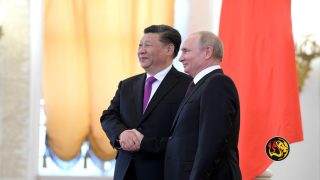
By Stefan J. Bos, Chief International Correspondent Worthy News
ASTANA/BUDAPEST (Worthy News) – Russian President Vladimir Putin and China’s Xi Jinping deepened their security ties Wednesday, with both leaders praising their Eurasian alliance as a force to challenge Western influence.
Putin, who is overseeing a Russian invasion of Ukraine, said the relations with China were “at their best period in history.”
He met Xi in Kazakhstan’s capital, Astana, on Wednesday, where they attended a summit of the Shanghai Cooperation Organisation (SCO).
Moscow and Beijing see the Eurasian security and defense club as an instrument to counter the influence of the United States and its allies in international affairs.
Alongside Russia and China, the SCO includes four Central Asian states: India, Iran, and Pakistan. United Nations Secretary-General Antonio Guterres was also expected to make an appearance.
Russia and China have deepened their political, military, and economic ties since Russia invaded Ukraine in February 2022. “The organization has firmly established itself as one of the key pillars of a fair, multipolar world order,” Putin stressed.
BLOCKS ALLIANCES
“Our cooperation is not aimed against anyone; we are not creating any blocs or alliances; we are just acting in the interests of our peoples,” he added.
Xi told Putin that China and Russia should “uphold the original aspiration of friendship for generations” in response to an “ever-changing international situation.”
Calling the Russian leader an “old friend,” Xi spoke about “the progress” the two countries made in implementing “plans and arrangements for the next development of bilateral relations.”
The Kremlin said Putin held a series of bilateral meetings on the sidelines of the SCO, which facilitates regional cooperation against security threats such as drug trafficking and ”domestic instability.”
Ahead of his meeting with Xi, Putin met Turkish President Tayyip Erdogan, Pakistani Prime Minister Shehbaz Sharif, and the presidents of Azerbaijan and Mongolia, Ilham Aliyev and Ukhnaagiin Khurelsukh.
Belarus, a close ally of Moscow hosting Russian tactical nuclear weapons, will attend the Astana summit for the first time as a full member of the SCO, the Kremlin announced.
‘EXISTENTIAL CONTEST’
Putin and Xi made clear that the SCO, in their view, shows that the U.S.-dominated post-Cold War era is crumbling.
The U.S. casts China as its biggest competitor and Russia as its biggest nation-state threat. U.S. President Joe Biden said this century will be defined by “an existential contest” between democracies and autocracies.
The SCO previously criticized what it called the negative impact of “unilateral and unlimited expansion of global missile defense systems by certain countries or groups of countries” without directly referring to NATO expansion or Western military assistance to Ukraine
Therefore, the West was closely following Wednesday’s Putin-Xi meeting amid concerns about their nations’ security ties at a time when Europe faces its biggest armed conflict this century.
Beijing has not condemned Moscow’s full-scale invasion of Ukraine and did not attend last month’s international peace conference in Switzerland.
However, China appears to have avoided providing weapons and ammunition for Russia’s war effort despite Moscow and Beijing declaring “no limits” ties just days before Moscow’s invasion of Ukraine in February 2022.
PEACE PLAN
Beijing has since put forward a 12-point paper outlining general principles for ending the war but did not get into specifics.
Russian Foreign Minister Sergei Lavrov suggested that China arrange a peace conference in which Russia and Ukraine can participate.
In Europe, Hungary has also said it is prepared to host peace talks between the two nations. The war in Europe adds to a full plate of armed, or nearly armed, conflicts worrying the West, ranging from the Israel-Hamas war to Chinese military threats toward Taiwan.
Yet despite its ties with Moscow, Beijing underscored a pragmatic economy-driven approach: Xi presided over a ceremony on Wednesday with his Kazakh counterpart to mark the departure of a fresh batch of cargo along the Trans-Caspian International Transport Route.
The route, also known as the Middle Corridor, starts in southeast Asia and China and runs through Kazakhstan, the Caspian Sea, Azerbaijan, Georgia, and further to Europe. The West has heavily promoted it as an alternative to Asia-Europe land transit via Russia.
Xi made sure he attended the ceremony just hours before meeting Putin.
(With additional reporting by the Worthy News Europe Bureau in Budapest).
Copyright 1999-2026 Worthy News. This article was originally published on Worthy News and was reproduced with permission.
Latest News from Worthy News
The Trump administration has finalized a sweeping reciprocal trade agreement with Taiwan, confirming a 15 percent U.S. tariff rate on Taiwanese imports while securing broad new market access and purchase commitments for American goods.
Democrats are applauding White House border czar Tom Homan’s Thursday announcement that immigration enforcement operation in Minnesota will end next week.
Democrats in the U.S. Senate tanked the Homeland Security full-year funding bill in a last-ditch vote Thursday, all but guaranteeing a partial government shutdown starting Saturday.
Mourners in a remote Canadian town grappled Thursday with the aftermath of one of the country’s deadliest school shootings in decades, as families, survivors and leaders reacted to the tragedy that left eight victims — most of them children — dead, along with the 18-year-old suspect.
A gunman who opened fire at a school in southern Thailand’s Hat Yai city on Wednesday wounded a teacher and a student before being detained, authorities said, in a rare attack that sent students and staff into panic.
The Republican-led House of Representatives has passed the Safeguard American Voter Eligibility (SAVE) America Act, advancing legislation that would require proof of citizenship to register to vote and photo identification at the polls. The bill now heads to the Senate, where its future remains uncertain amid strong Democratic opposition.
Israel’s Ministry of Defense announced on Wednesday that its advanced David’s Sling air and missile defense system has completed a series of complex modernized tests, a development officials say bolsters the country’s defensive posture as tensions with Iran escalate and the United States prepares military options that could include direct strikes.







